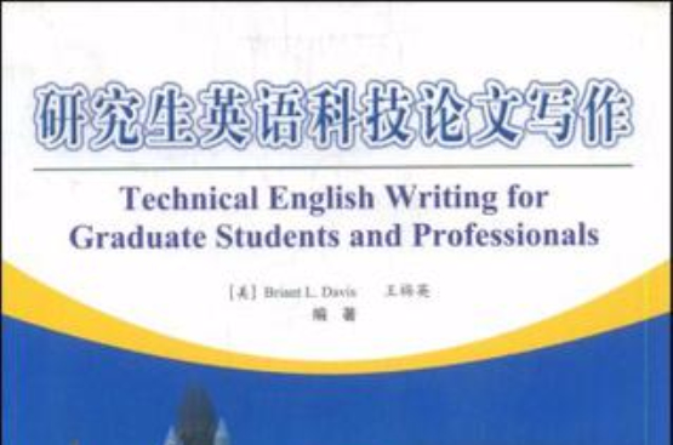圖書信息
正文語種: 英語
開本: 16
ISBN: 7040203537
條形碼: 9787040203530
尺寸: 25.4 x 19.5 x 1 cm
重量: 340 g
作者簡介
作者:(美國)戴維斯 王梅英
內容簡介
《研究生英語科技論文寫作》包括了英文科技論文寫作的語言技巧.基本格式、結構分析、論文類型、投稿注意事項等。本書有三個特點: (1)涵蓋的英語科技論文寫作的學科廣。書中使用了大量通俗易懂的科技英語範例,涉及地質、生物、化學、化工、材料、物理、礦業、氣象等多種學科。
(2)錯誤分析對提高英語寫作水平意義重大。在教學過程中作者積累了大量的學生寫作素材,通過對素材進行歸納和總結,列出中國學生的常見錯誤,如語法錯誤。措辭不當、邏輯錯誤、漢語思維、段落結構不合理等,書中配有大量練習幫助學生識別錯誤,提高寫作水平。
(3)適合讀者面廣。高等院校的高年級本科生、研究生和科技工作者中,凡希望參加國際會議和在國際期刊上發表論文的讀者都會受益。目前全國高等院校在讀研究生規模龐大,其中大多數為理工科學生,很多人希望在國際期刊或國際會議發表論文,科研院所中許多科技工作者希望參加重大國際科技合作和國際會議交流。向國際知名期刊投稿,是讓研究成果在國際上有比較高的知名度的重要途徑。
目錄
hapter 1 - Introduction 1
1.1 What Do We Need the Most? 2
1.2 How Best to Use This Book 6
1.3 Exercises 7
Chapter 2 - Review of Basic Writing Skills 11
2.1 Grammar Usage 12
2.i.1 Subjects and Nouns and Their Verbs 1.2
2.1.2 Article Adjectives 13
2.1.3 Prepositions 15
2.1.4 Conjunctions and Connectives 18
2.1.5 Noun and Verb Modifiers 19
2.1.5.1 Adjectives 19
2.1.5.2 Adverbs 21
2.2 Punctuation 22
2.2.1 The Comma (,) and Semicolon (;) 22
2.2.2 The colon (:) 23
2.2.3 The Exclamation Mark (!) 23
2.2.4 The Question Mark (?) 24
2.2.5 Quotation Marks ( "..." ) 24
2.2.6 The Dash (-) 24
2.3 Capitalization 25
2.4 Word Selection and Usage 26
2.5 Exercises 27
2.6 References (English Writing Texts and Workbooks) 30
Chapter 3 - Sentences 33
3.1 Basic Sentence Structure 35
3.1.1 Sentence Building 35
3.1.2 Sentence Qualities 36
3.1.2.1 Conciseness 36
3.1.2.2 Content Emphasis 37
3.1.2.3 Balance 38
3.1.2.4 Parallelism 38
3.1.2.5 Clarity 39
3.1.3 Tense Changes 40
3.2 Exercises 41
3.3 References 46
Chapter 4 - Paragraphs 47
4.1 Properties of Paragraphs 48
4.1.1 Unity 48
4.1.2 Conciseness 50
4.1.3 Organization 52
4.2 Composition Styles 54
4.2.1 Narrative 55
4.2.2 Expository 55
4.2.3 Argumentation 56
4.2.4 Descriptive 57
4.3 Methods of Development 58
4.3.1 Development by Time (Chronology) 58
4.3.2 Development by Space 59
4.3.3 Development by Process 59
4.3.4 Development by Comparison and Contrast 60
4.4 Exercises 68
4.5 References 63
Chapter 5 -.The Technical Research Paper 65
5.1 Writing Styles for Technical Subjects 66
5.2 Methods for Presenting Data 68
5.2.1 Photographs 68
5.2.2 Drawings (Graphs, Maps, Diagrams) 69
5.2.3 Tables 73
5.2.4 Equations 75
5.3 Exercises77
5.4 References 80
Chapter 6-Section Development 81
6.1 Development Scheme 82
6.2 Introduction and Previous Work 84
6.3 Field and Experimental Methods 86
6.4 Data Analysis 89
6.5 Results 91
6.6 Discussion 93
6.7 Conclusions 96
6.8 Credits to Others 98
6.8.1 Acknowledgements 98
6.8.2 References 100
6.8.2.1 Professionalism 100
6.8.2.2 Reference Styles 102
6.9 Abstract (Including Title and Authorship) 103
6.9.1 Title and Authorship 104
6.9.2 Abstract Content 105
6.10 Exercises 109
6.11 References 117
Chapter 7-Special Precautions 119
7.1 Timing 120
7.1.1 Prior Work 120
7.1.2 Promptness in Publication 122
7.1.3. Peer Review and Revision 123
7.1.4 Continued Research and Publication 127
7.2 Professional Ethics 128
7.3 The Reply and Rebuttal 129
7.4 Conference Presentation 133
7.5 Exercises 134
7.6 References 137
Chapter 8 - Publication 139
8.1 Selection of the Publication Outlet 140
8.1.1 Length 140
8.1.2 Technical Level 141
8.1.3 Topic 142
8.2 The Referee Process——Perseverance in Publication 143
8.3 Costs of Publishing a Paper 145
8.4 Copyright and Proprietary Requirements 145
8.5 Exercises 146
8.6 References 147
Chapter 9 - Abstract Study and Language Translation 149
9.1 Translation Examples 151
9.2 English Publication Examples with Suggestions onTranslation 157
9.3 Exercises 163
Appendix I-Solutions to Odd-Numbered Exercises 167
Appendix II-Commonly Used Scientific and Engineering Units 182
Appendix Ill-Editor's Marks and Codes 183
Appendix IV-A Glossary of Semi -Technical Terms Used in This Book 184
Appendix V-List of Text Examples and Exercises 193

